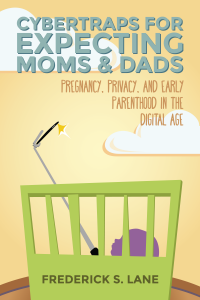 [Author’s Note: This is an excerpt from my recently published book, Cybertraps for Expecting Moms & Dads. The Kindle version was published on September 21; the paperback version will be available in the next couple of weeks. If you would like to be notified of its publication and about other topics like this, please fill out the sign-up form in the right-hand column.]
[Author’s Note: This is an excerpt from my recently published book, Cybertraps for Expecting Moms & Dads. The Kindle version was published on September 21; the paperback version will be available in the next couple of weeks. If you would like to be notified of its publication and about other topics like this, please fill out the sign-up form in the right-hand column.]
You Are Now a Fetish Object
One of the more disturbing examples of how hard it is to control the use or misuse of publicly posted photos occurred last year, when several Australian non-profits warned that pregnancy bump photos were being stolen and uploaded to pornographic Web sites catering to those with a so-called “preggophilia” fetish (the actual technical term is maiesiophilia or maieusophoria). The circumstances of the case help illustrate the scope of the problem.
The story begins with the pregnancy of Meg Ireland, an Australian woman living near Sydney. Towards the end of her pregnancy, the petite Ireland posted a photo of her sizable belly bump on her Instagram account.
“The goal, Ireland said in an email, “was to reach out to my friends and family who wanted to see my growing bump. There were people on my Instagram who loved seeing my weekly bump updates – so I would post to keep them updated with how I was travelling. I didn’t think anything of it, as a woman should be proud of her growing baby belly!”
Somehow, an individual found Ireland’s baby bump photo deep in her Instagram account. Using a copy of that photo, he or she posed as a pregnant woman to gain access to various closed Facebook communities devoted to multiple-birth pregnancies. The imposter then asked other members of the groups to share photos of their baby bumps, which he then copied and subsequently uploaded to one or more preggophilia Web sites. Ironically, Ireland herself was not a member of any multiple-birth groups; despite the dramatic size of her baby bump, she was just expecting a single child.
A number of multiple birth associations in Australia, New Zealand, and Canada promptly issued warnings to their members about the incident and circulated the aliases that were used to create the fake Facebook accounts. However, given the ease with which new accounts can be created on social media, it was not clear what could be done to prevent similar attempts in the future.
Dr. Wendell Rosevear, O.A.M., who runs the Stonewall Medical Center in Windsor, Australia and who specializes in cases involving sex abuse victims and perpetrators, points out that mere sexual fantasy is not a crime:
There are as many sexual diversities and appreciations and fantasies as there are people in the world and that’s not an issue, unless one person doesn’t respect another person’s right to choice or privacy. Essential to valuing people is to respect their choice, so when you go outside respecting choice, it’s called abuse.
Dr. Rosevear’s assessment is largely correct. While perhaps distasteful, the viewing your pregnancy photo online for the purpose of sexual gratification is not a crime. However, stealing your photograph and sharing it without your consent to others with similar interests is at the very least an invasion of your right to privacy. I’m not entirely sure that it qualifies as a form abuse. I suggested in a recent blog post that we should categorize the non-consensual sharing of intimate photos as “electronic sexual assault,” but I’m not certain that the re-sharing of publicly-posted photos, even those posted with tight privacy restrictions, should be classified as a criminal act.
In any case, the real question is what decision you and your partner will make regarding the posting of baby-bump and other pregnancy-related photos. As I have said, there is no right answer here; it really just comes down to how comfortable you are with the idea that you really can’t control what other people do with your photos once they’ve been posted. Meg Ireland offers a useful perspective:
This experience has definitely made me more cautious about posting photos on social media. I don’t share anywhere near half as what I did before. When I do post photos, I am very cautious about my surroundings, and make sure no one that doesn’t know me in person, can figure out where me or my family is.
My advice for other mothers would be to be very cautious about tagging your location in your posts, street signs that may be visible, and to be wary about what type of photos you post online. Children in their underwear should be a serious no-no. While it is nothing to us, it unfortunately can mean a lot more to someone with a fetish. Us mothers shouldn’t have to worry about these things, but if you think of it now, save yourself the hurt and anger you will go through if they end up in the hands of the wrong person.